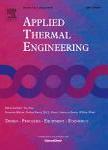版权所有:内蒙古大学图书馆 技术提供:维普资讯• 智图
内蒙古自治区呼和浩特市赛罕区大学西街235号 邮编: 010021

作者机构:Dalian Univ Technol Dept Chem Machinery Dalian 116012 Peoples R China PipeChina Engn Technol Innovat Co Ltd Tianjin 300450 Peoples R China Dalian Ocean Univ Dept Machinery & Power Engn Dalian 116023 Peoples R China
出 版 物:《APPLIED THERMAL ENGINEERING》 (Appl Therm Eng)
年 卷 期:2025年第265卷
核心收录:
学科分类:0820[工学-石油与天然气工程] 080702[工学-热能工程] 08[工学] 0807[工学-动力工程及工程热物理] 0802[工学-机械工程] 0801[工学-力学(可授工学、理学学位)]
基 金:Fundamental Research Funds for the Central Universities [DUT24BS035, DUT24RC(3)057] National Natural Science Foundation of China National Key Research and Development Program of China [2018YFA0704600] Research project of PipeChina [DTXNY202202] DUT22LAB604
主 题:Cold energy power generation Multi-stream heat exchange Liquefied natural gas Working fluid Genetic algorithm optimization
摘 要:This study investigates the impact of working fluids on the performance of Liquid Natural Gas (LNG) Cold Energy power generation cycles and identifies the optimal fluid for a multi-stream cascade combined cycle (MS-CCC). A genetic algorithm with mixed integer nonlinear programming is employed to optimize the MS-CCC, comparing it with traditional combined cycles and cascade combined cycles using both single-component and binary mixed working fluids. The candidate working fluids are innovatively selected based on normal boiling point temperatures, with a uniform distribution across the range of -128 degrees C to -2 degrees C, covering most of the LNG vaporization process. Analysis results indicate that using binary mixed working fluids effectively enhances heat transfer matching within condensers in MS-CCC and significantly improves the exergy output of the bottom cycle working fluid, thereby greatly reinforcing the advantages of MS-CCC in utilizing working fluid cold energy. With the optimal mixed working fluid, MS-CCC achieves a net power output (Wnet) of 4262.2 kW and an exergy efficiency (eta ex) of 24.3 %, marking a 32.5 % increase in eta ex compared to employing optimal single-component working fluid. The selection of the base component with a lower saturated temperature in bottom cycle significantly affects MS-CCC performance by simultaneously impacting the cold energy extraction in both cycles. Variations in mole fractions of the working fluid components also impact MS-CCC efficiency. Deviations of 30 % from the optimal mole fraction can reduce Wnet by over 23 %. These findings provide valuable insights for optimizing cold energy power generation cycles.